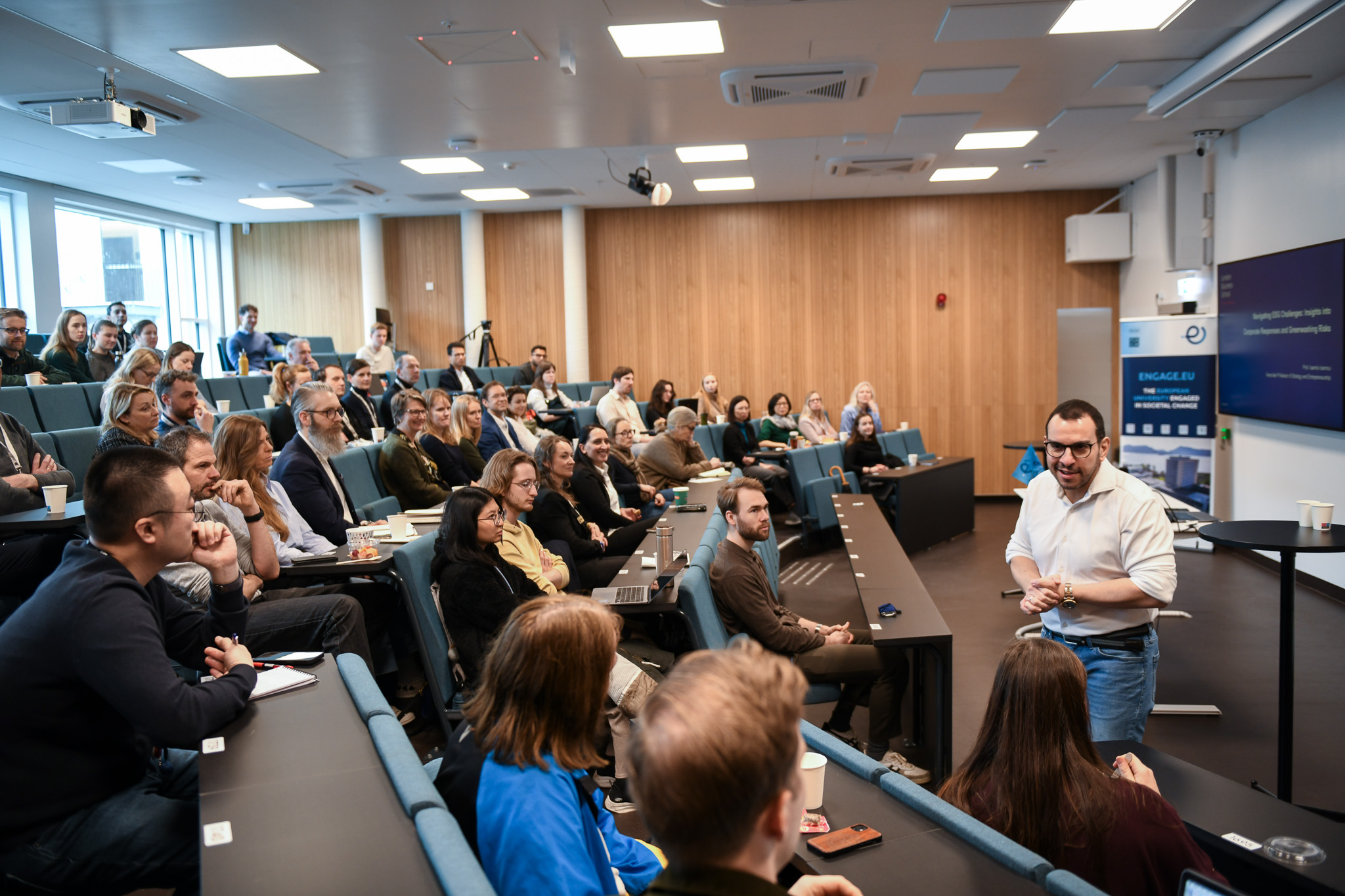
The ENGAGE.EU Think Tank serves as an annual event dedicated to fostering collaborative research among the nine ENGAGE.EU partners and propelling academic inquiry forward on pressing global challenges. The third installment was held from 11 – 15 March in Bergen, Norway. NHH Norwegian School of Economics hosted the event, drawing nearly 30 researchers from various disciplines to explore the intricacies of “Leading the green transition: Advancing research for sustainable value creation.” Structured around three central tracks—sustainable business, sustainable finance, and sustainability reporting—the Think Tank provided an immersive platform for stimulating discussions, interactive workshops, and networking opportunities.
Over an intense week, participants at the ENGAGE.EU Think Tank were treated to a rich lineup of events. The program featured insights from NHH faculty, industry partners, and keynote speakers, along with presentations in collaboration with Bergen’s “Wetter Wilder Warmer” Climate Festival. A highlight of this year’s gathering was the keynote lecture delivered by Associate Professor Ioannis Ioannou from the London Business School. Renowned for his expertise in strategy, particularly in the realm of sustainability and corporate social responsibility, Ioannou delved into the urgent topic of navigating Environmental, Social, and Governance (ESG) challenges, reflecting the core focus of this year's gathering on advancing research for sustainable value creation.
In his lecture titled "Navigating ESG Challenges: Insights into Corporate Responses and Greenwashing Risks," Ioannou examined corporate ESG performance, addressing the increasing pressures companies face to demonstrate sustainability commitment and the complexities of their approaches. Drawing from his latest research, he presented insights from his co-authored article "Willing and Able: A General Model of Organizational Responses to Normative Pressures," which offers a comprehensive framework capturing organizational willingness and ability to conform to external norms. This model distinguishes between symbolic compliance, substantive compliance, and strategic defiance, exploring influencing factors. The keynote lecture synthesized empirical research and theoretical insights, providing valuable understanding of how organizations respond to normative pressures, their underlying mechanisms, and implications for behavior and performance.
During his keynote, Ioannou also referenced his co-authored article "CSR Decoupling within Business Groups and the Risk of Perceived Greenwashing." He highlighted how inconsistencies between corporate social responsibility (CSR) commitments and practices among individual subsidiaries influence perceptions of greenwashing. The findings indicate that CSR decoupling within business groups significantly heightens perceived greenwashing risk, as stakeholders may perceive disparities between a group's CSR rhetoric and its subsidiaries' actual practices. His keynote lecture shed light on understanding the complexities of CSR implementation within business groups and underscores the importance of aligning CSR practices across subsidiaries to mitigate greenwashing risk and maintain corporate reputation and legitimacy.
The keynote lecture also examined the theme of how perceived greenwashing affects customer satisfaction, referencing recent research titled "The Impact of Perceived Greenwashing on Customer Satisfaction and the Contingent Role of Capability Reputation." Ioannou explored how customers' perceptions of greenwashing practices influence their satisfaction with a company's products or services, and how a firm's capability reputation can moderate this relationship. He highlighted that perceived greenwashing tends to negatively affect customer satisfaction, especially when customers perceive the firm to have a strong capability reputation. Conversely, firms with a weaker capability reputation may be able to mitigate the adverse effects of greenwashing on customer satisfaction. His insights shed light on the complexities surrounding greenwashing and its implications for customer perceptions, underscoring the strategic importance of capability reputation in managing reputational risks associated with greenwashing practices.
The ENGAGE.EU Think Tank initiative once again emphasized the value of academic exchanges in driving research innovation and fostering cooperation. This year’s Think Tank highlighted the urgent need for collaborative research on sustainable solutions, with Ioannis Ioannou's keynote on ESG challenges and greenwashing stressing the importance of interdisciplinary collaboration. With its rich lineup and cooperative atmosphere, the Think Tank in Bergen served as a catalyst for laying the groundwork for future collaborations in pursuit of sustainability. Moving forward, continued partnerships within our ENGAGE.EU alliance stemming from this event hope to advance our understanding and contribute to actionable initiatives for a sustainable future.